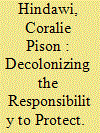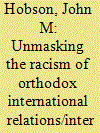|
|
|
Sort Order |
|
|
|
Items / Page
|
|
|
|
|
|
|
| Srl | Item |
| 1 |
ID:
183726


|
|
|
|
|
| Summary/Abstract |
Many postcolonial or critical scholars are rather sceptical of the Responsibility to Protect principle. In most of the critical literature, Responsibility to Protect (R2P) is presented as a product from the West, whose liberal ideal relies on a perception of Southern states being potentially dysfunctional, which in turn justifies an interventionist discourse with neocolonial overtones. The problem with this interpretation of R2P is that it essentially ignores non-Western, particularly Southern, inputs on the concept, falling precisely into the trap that, many authors claim, vitiates Responsibility to Protect: its West-centrism. Building upon a mix of critical, decolonial, postcolonial and Third World Approaches to International Law scholarship, this article proposes a number of additional steps to decolonize R2P in an effort to avoid what Pinar Bilgin describes as ‘conflating the critiques of the particularity of universals with critiques of the idea of having universals’. What successive decolonizing layers expose is a negotiation process in which the agency of states from the global South in shaping the – still controversial – principle has proved particularly obvious. Decolonizing Responsibility to Protect, this article argues, requires critical scholars to engage in a contrapuntal analysis in order to acknowledge the concept’s mutual constitution by the West and the ‘rest’ and the deeper struggles over universals hiding underneath.
|
|
|
|
|
|
|
|
|
|
|
|
|
|
|
|
| 2 |
ID:
183728


|
|
|
|
|
| Summary/Abstract |
Like all warfare, drone warfare is deeply gendered. This article explores how this military technology sediments or disrupts existing conceptualizations of women who kill in war. The article using the concept of motherhood as a narrative organizing trope and introduces a ‘fictional’ account of motherhood and drone warfare and data from a ‘real life’ account of a pregnant British Reaper operator. The article considers the way trauma experienced by Reaper drone crews is reported in a highly gendered manner, reflecting the way women’s violence is generally constructed as resulting from personal failures, lost love and irrational emotionality. This irrational emotionality is tied to a long history of medicalizing women’s bodies and psychologies because of their reproductive capacities and, specifically, their wombs – explored in this article under the historico-medical term of ‘hysteria’. The article argues that where barriers to women’s participation in warfare have, in the past, hinged upon their (argued) physical weakness, and where technology renders these barriers obsolete, there remains the tenacious myth that women are emotionally incapable of conducting lethal operations – a myth based on (mis)conceptions of the ‘naturalness’ of motherhood and the feminine capacity to give life.
|
|
|
|
|
|
|
|
|
|
|
|
|
|
|
|
| 3 |
ID:
183725


|
|
|
|
|
| Summary/Abstract |
Over the last two decades, the European border regime has become the subject of a growing body of scholarship in critical security studies. In this article, I draw on Stuart Hall’s work on racialized policing, authoritarian populism and conjunctural analysis to argue that this literature has paid insufficient attention to the close relationship between racism, capitalism and state violence. Writing at the dawn of Thatcherism and neoliberal globalization, Hall theorized the growth in repressive state structures as a revanchist response to breakdowns in racial hegemony. Revisiting these insights, the article argues that the ongoing expansion of the European border regime is a hegemonic strategy of racialized crisis management. The imposition of ever more restrictive immigration policies, increased surveillance and heightened forms of deportability are attempts to defend white bourgeois order and to police a (neoliberal) racial formation in crisis. The migrant ‘crisis’ is ultimately the result of one racialized world order collapsing, and another struggling to be born.
|
|
|
|
|
|
|
|
|
|
|
|
|
|
|
|
| 4 |
ID:
183727


|
|
|
|
|
| Summary/Abstract |
How must we understand and conceptualize the rationales and repercussions of remote warfare? This article contributes to scholarship on the ontology of remote war by analysing how Dutch officials engage with responsibility for the bombardment of an Islamic State weapons factory in Hawija, Iraq in 2015 under Operation Inherent Resolve. It observes that the main feature of Dutch officials’ accounts of Hawija is their diverse claims to not knowing about civilian casualties. Official narratives shifted from denial to secrecy to strategic ignorance. Bridging work on secrecy from the field of critical security studies with work on strategic ‘unknowing’ from ignorance studies, we propose a new take on the Foucauldian notion of ‘regimes of truth’. The regimes of truth that emerge to justify shifts to remote warfare – that it is riskless, precise and caring for civilian others – rely not merely on secrecy and denial but on feigned and imposed ignorance about casualties. Whereas denial can be disproven and secrecy has an expiration date, ignorance is more elusive and open-ended and hence politically convenient in different ways. Deliberate unknowing does not just postpone investigation and accountability but fundamentally and indefinitely obstructs it and thus sustains the regimes of truth for future remote wars.
|
|
|
|
|
|
|
|
|
|
|
|
|
|
|
|
| 5 |
ID:
183724


|
|
|
|
|
| Summary/Abstract |
This article emerges out of the racism debate in Security Dialogue (May 2020). It takes its cue from the passing claim that Orientalism/Eurocentrism is different from racism and that the former is deemed to be relatively innocuous while the latter is viewed as egregious. Here I reveal how Eurocentrism is equivalent to cultural racism. I show how racism has outwardly shapeshifted through time in everyday life and world politics, and how orthodox international relations theory’s racist trajectory has mirrored this. Since 1945, modern orthodox international relations theory has covered its racism with a non-racist mask through a sublimated discourse that focuses on cultural difference but is white racism in disguise. Unmasking modern international relations/international political economy theory exposes this sublimated racist discourse by revealing its racist double move: first, it whitewashes racism and denies its presence in the conduct of world politics and the global economy in the last three centuries, thereby providing an apologia for racist practices; second, it advances subliminal cultural-racist analytical/explanatory frameworks. I close by solving the conundrum as to how white orthodox international relations scholars who are most probably non-racist (though not anti-racist) in their personal lives embrace, albeit unwittingly, racist theories of world politics and the global economy.
|
|
|
|
|
|
|
|
|
|
|
|
|
|
|
|
|
|
|
|
|